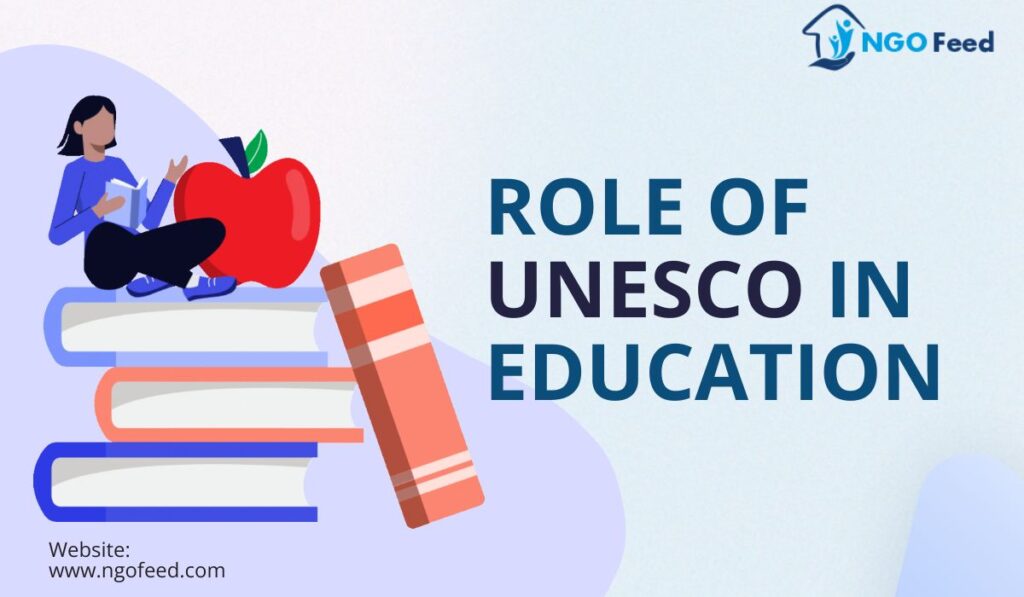Role of UNESCO in Education: UNESCO, the United Nations Educational, Scientific and Cultural Organization, was founded in the aftermath of World War II as nations sought to rebuild and foster peace through international cooperation. The concept for the organization stemmed from prior efforts to promote cultural and educational exchanges, but the war’s devastating impact highlighted the need for a more unified approach.
On November 16, 1945, UNESCO was officially established when representatives from 37 countries signed its Constitution at a conference in London. The organization’s core mission is to promote peace and security by fostering international collaboration in education, science, and culture. It aims to achieve lasting peace through mutual understanding, respect for human rights, and commitment to moral and intellectual solidarity. The role of UNESCO in Education is discussed in this article in detail.
Table of Contents
UNESCO’S Global Education Agenda
Education 2030 and Sustainable Development Goal 4:
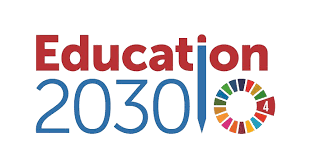
- UNESCO is the lead agency for SDG 4, which aims to “ensure inclusive and equitable quality education and promote lifelong learning opportunities for all.”
- The Education 2030 Framework for Action guides global efforts towards achieving these targets by 2030.
Global Education Monitoring (GEM) Report:
- UNESCO publishes the annual GEM Report, which monitors progress toward SDG 4, provides data analysis, and highlights key challenges in global education.
- The report serves as a key tool for policymakers and educators to assess the state of education worldwide.
Partnerships and Collaboration with Governments and Organizations:
- UNESCO works closely with national governments, NGOs, and international organizations to implement educational policies and programs.
- It facilitates global and regional partnerships to enhance education systems and address common challenges.
Promoting Quality Education by UNESCO
Teacher Training and Professional Development
- UNESCO supports initiatives to enhance the skills and competencies of teachers through training programs, professional development workshops, and educational resources. This includes promoting effective teaching practices and supporting teachers in diverse contexts.
Curriculum Development and Educational Resources
- UNESCO contributes to the development of curricula that are relevant, inclusive, and adaptable to different educational contexts. It also provides educational resources and tools to help educators and students achieve learning goals.
Advancing Literacy and Numeracy Skills
- Efforts are made to improve literacy and numeracy rates worldwide, especially in regions with high illiteracy rates. UNESCO supports programs and initiatives designed to enhance basic skills and ensure that educational content is accessible and effective.
UNESCO and Inclusive Education
Addressing Gender Equality in Education
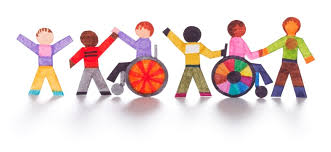
- UNESCO promotes gender equality in education by working to eliminate barriers that prevent girls and women from accessing education. This includes advocating for policies that support equal opportunities and addressing gender-based disparities in educational outcomes.
Initiatives for Marginalized and Vulnerable Groups
- UNESCO develops programs to support the educational needs of marginalized groups, including ethnic minorities, refugees, and people with disabilities. These initiatives aim to create inclusive educational environments where all learners can thrive.
Special Education Programs
- UNESCO supports special education programs that cater to students with disabilities or special educational needs. These programs are designed to provide appropriate resources and accommodations to ensure that every student has access to quality education.
Role of UNESCO in Lifelong Learning
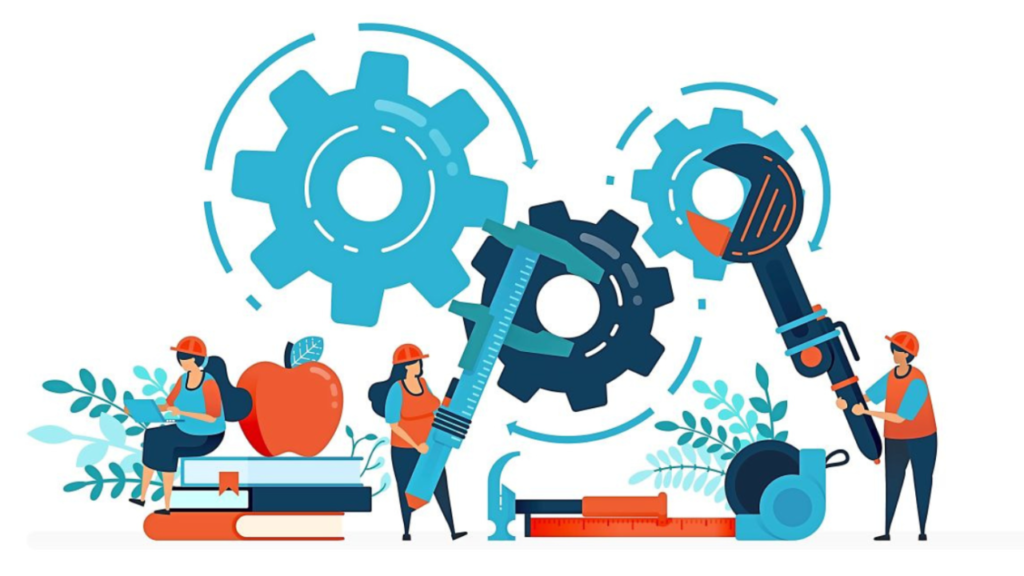
Adult Education and Vocational Training
- UNESCO advocates for lifelong learning opportunities, including adult education and vocational training programs. These programs are designed to enhance skills, improve employability, and support personal development throughout an individual’s life.
Literacy Initiatives for Adults
- Adult literacy programs are essential for empowering individuals and communities. UNESCO supports various initiatives aimed at improving literacy rates among adults, particularly in underserved areas.
Promoting Continuous Learning Through Technology
- Emphasizing the role of technology in education, UNESCO promotes the use of digital tools and online learning platforms to facilitate continuous learning and skill development. This includes supporting access to technology and digital resources.
UNESCO: Supporting Education in Crisis and Conflict Zones
Emergency Education Response Strategies
- In conflict and crisis situations, UNESCO coordinates emergency education responses to ensure that children and youth have access to schooling. This includes setting up temporary learning spaces and providing essential educational materials.
Rebuilding Education Systems in Post-Conflict Regions
- After conflicts, UNESCO assists in rebuilding and rehabilitating education systems. This involves reconstructing schools, training teachers, and developing curricula to address the specific needs of affected communities.
Protecting Cultural Heritage in Education
- UNESCO also works to protect cultural heritage in educational contexts, ensuring that the history and identity of affected communities are preserved and integrated into the educational process.
UNESCO and Digital Learning
Promoting Digital Literacy and ICT in Education
- UNESCO supports initiatives to integrate information and communication technology (ICT) into education systems, enhancing digital literacy and enabling students to develop essential 21st-century skills.
Developing Open Educational Resources (OER)
- Open Educational Resources are freely accessible and openly licensed educational materials. UNESCO promotes the development and use of OER to ensure that quality educational resources are available to learners worldwide.
Bridging the Digital Divide in Education
- Efforts are made to address disparities in access to technology and digital resources, ensuring that students from disadvantaged backgrounds have the same opportunities for digital learning as their peers.
UNESCO’S Educational Research and Innovation
Research Programs and Policy Analysis
- UNESCO conducts research and analysis to inform educational policy and practice. This includes studying educational trends, evaluating programs, and providing evidence-based recommendations for improving education systems.
Innovations in Pedagogy and Learning Methods
- The organization promotes innovative approaches to teaching and learning, including new pedagogical methods, educational technologies, and creative learning environments that enhance student engagement and outcomes.
Monitoring and Evaluating Education Systems Globally
- UNESCO monitors and evaluates education systems to assess their effectiveness and impact. This involves collecting data, analyzing educational trends, and providing insights to guide policy and practice.
UNESCO’s Regional and National Education Initiatives
Regional Offices and Their Impact
- UNESCO has regional offices that coordinate education initiatives tailored to the specific needs of different regions. These offices play a crucial role in implementing UNESCO’s global strategies at the local level.
Case Studies of UNESCO’s Impact at the National Level
- Examples of successful UNESCO projects and programs at the national level highlight how its initiatives have positively impacted education systems and communities in various countries.
Cooperation with National Education Ministries
UNESCO collaborates with national education ministries to support policy development, program implementation, and capacity building, ensuring educational initiatives align with national priorities and contexts.
Achievement of UNESCO
Global Literacy Improvement
- Increase in Literacy Rates: Since the 1950s, global literacy rates have significantly improved. UNESCO’s efforts in promoting literacy programs have contributed to the rise in adult literacy from approximately 56% in 1950 to over 86% in 2020.
- Reduction in Illiteracy: The number of illiterate adults worldwide decreased from 881 million in 1990 to 773 million in 2019, largely due to UNESCO’s global literacy campaigns and initiatives.
Gender Equality in Education
- Reduction in Gender Disparity: UNESCO has played a crucial role in reducing gender disparities in education. The global gender parity index (GPI) for primary education improved from 0.92 in 2000 to 0.99 in 2020, indicating near parity between boys and girls.
- Increase in Girls’ Enrollment: The global number of girls enrolled in primary school increased by more than 75 million between 1995 and 2018, thanks to UNESCO’s advocacy and support for policies promoting girls’ education.
Expansion of Access to Education
- Primary Education Enrollment: Primary school enrollment rates have significantly increased, with global net enrollment rates rising from 83% in 2000 to 91% in 2020. This progress is partly due to UNESCO’s support for the Education for All (EFA) initiative and the Millennium Development Goals (MDGs).
- Out-of-School Children: The number of out-of-school children of primary school age decreased from 108 million in 1999 to 58 million in 2019. UNESCO’s efforts in promoting universal access to education have been instrumental in this decline.
Promotion of Technical and Vocational Education and Training (TVET)
- Expansion of TVET Programs: UNESCO has been pivotal in expanding Technical and Vocational Education and Training (TVET) programs globally. As of 2019, approximately 13% of students at the upper secondary level were enrolled in TVET programs, up from 10% in 2000.
- TVET Enrollment Growth: TVET enrollment in sub-Saharan Africa grew by 20% between 2000 and 2018, reflecting UNESCO’s focus on developing skills for the labor market in developing regions.
Support in Education for Crisis-Affected Regions
- Education in Emergencies: UNESCO has provided educational support in over 60 crisis-affected countries, benefiting more than 20 million learners. This includes setting up temporary schools, distributing educational materials, and training teachers in conflict zones.
- Rehabilitation of Schools: In post-conflict regions, UNESCO has contributed to the rebuilding of over 1,000 schools and educational facilities, particularly in areas affected by natural disasters and armed conflicts.
Advancement of Digital Education
- Global Access to ICT in Education: UNESCO’s advocacy for integrating Information and Communication Technology (ICT) in education has led to a significant increase in schools with access to the internet. By 2019, about 54% of primary schools and 67% of secondary schools worldwide had internet access, compared to less than 20% in 2000.
- Promotion of Open Educational Resources (OER): UNESCO has been a global leader in promoting OER. As a result, over 100 countries have adopted OER policies and practices, making quality educational resources more accessible.
UNESCO Chairs and Networks
- UNESCO Chairs in Education: Over 200 UNESCO Chairs in Education have been established worldwide, fostering research, knowledge sharing, and capacity building in various fields of education.
- Global Networks: UNESCO has created networks like the Global Education Coalition, which brings together over 150 partners to ensure the continuity of learning during crises such as the COVID-19 pandemic.
Conclusion
UNESCO plays a pivotal role in global education by promoting inclusive, equitable, and quality education for all. It coordinates international efforts to achieve Sustainable Development Goal 4, which aims to ensure lifelong learning opportunities. Through initiatives like the Education 2030 Agenda, UNESCO supports literacy programs, teacher training, curriculum development, and the integration of digital technologies in education. It also focuses on gender equality, education in crisis-affected areas, and the inclusion of marginalized groups. By providing research, policy guidance, and fostering international collaboration, UNESCO significantly contributes to the advancement of education worldwide.
Frequently Asked Questions (FAQs)
What is UNESCO’s main mission in education?
UNESCO’s main mission in education is to ensure inclusive and equitable quality education and promote lifelong learning opportunities for all. The organization works to advance global educational goals, address disparities, and support sustainable development through education.
How does UNESCO support global education initiatives?
UNESCO supports global education initiatives by leading and coordinating the Education 2030 agenda, providing technical assistance to countries, and fostering international cooperation. It also monitors progress through reports and collaborates with governments and organizations to implement effective education policies.
What is the Education 2030 agenda?
The Education 2030 agenda is a global framework set by UNESCO to achieve Sustainable Development Goal 4 (SDG 4), which aims to ensure inclusive and equitable quality education and promote lifelong learning opportunities for all by 2030. It outlines key priorities and actions for advancing global education.
What is the “Futures of Education” report, and why is it important?
The “Futures of Education” report is a UNESCO initiative that explores how education can be reimagined to address future challenges and opportunities. It is important because it provides a forward-looking perspective on how learning can shape a more sustainable and equitable future for humanity and the planet.
How does UNESCO help countries design and implement education policies?
UNESCO assists countries in designing and implementing education policies by providing technical advice, sharing best practices, and supporting data collection and analysis. It engages in dialogue with national authorities to tailor solutions to specific needs and challenges.
What are some recent global conferences organized by UNESCO?
Recent global conferences organized by UNESCO include those focusing on early childhood care and education (2022), higher education (2022), adult learning (2022), and education for sustainable development (2021). These conferences set the agenda for addressing key educational issues and promoting international collaboration.
What role does UNESCO play in advancing digital learning and technology in education?
UNESCO promotes digital literacy and the integration of Information and Communication Technology (ICT) in education by providing guidance, resources, and policy recommendations. It supports initiatives to bridge the digital divide and enhance access to technology for learners worldwide.
How does UNESCO address challenges in education caused by natural disasters and pandemics?
UNESCO responds to education challenges caused by natural disasters and pandemics by providing emergency support, developing continuity plans, and advocating for resilient education systems. It coordinates global efforts to ensure that education continues despite disruptions.
How does UNESCO monitor progress towards educational goals globally?
UNESCO monitors progress through various mechanisms, including the Global Education Monitoring (GEM) Report, periodic reviews of international commitments, and data collection from member states. These efforts help track progress towards education targets and identify areas for improvement.
What are some examples of UNESCO-supported educational innovations?
Examples include initiatives to incorporate digital learning tools, promote STEM education, and develop inclusive teaching methods. UNESCO supports innovative approaches that enhance learning experiences and address educational challenges.

